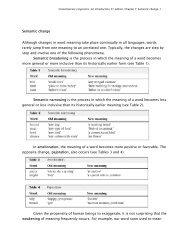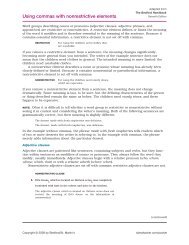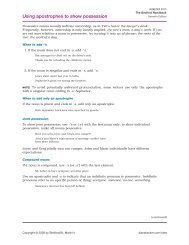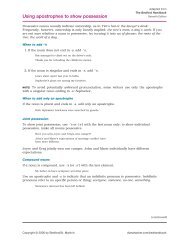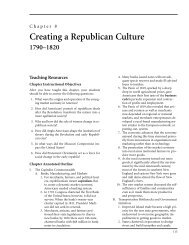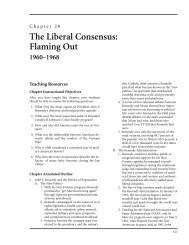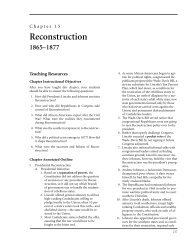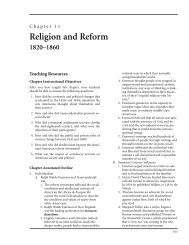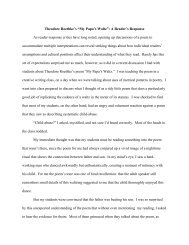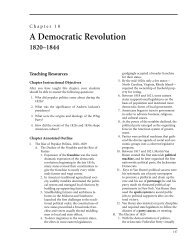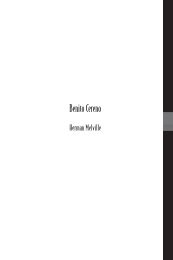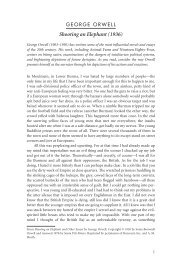GEORGE ORWELL, Politics and the English Language
GEORGE ORWELL, Politics and the English Language
GEORGE ORWELL, Politics and the English Language
Create successful ePaper yourself
Turn your PDF publications into a flip-book with our unique Google optimized e-Paper software.
<strong>ORWELL</strong> <strong>Politics</strong> <strong>and</strong> <strong>the</strong> <strong>English</strong> <strong>Language</strong> 3<br />
incompetence is <strong>the</strong> most marked characteristic of modern <strong>English</strong> prose, <strong>and</strong><br />
especially of any kind of political writing. As soon as certain topics are raised, <strong>the</strong><br />
concrete melts into <strong>the</strong> abstract <strong>and</strong> no one seems able to think of turns of speech<br />
that are not hackneyed: prose consists less <strong>and</strong> less of words chosen for <strong>the</strong> sake of<br />
<strong>the</strong>ir meaning, <strong>and</strong> more <strong>and</strong> more of phrases tacked toge<strong>the</strong>r like <strong>the</strong> sections of<br />
a prefabricated hen-house. I list below, with notes <strong>and</strong> examples, various of <strong>the</strong><br />
tricks by means of which <strong>the</strong> work of prose-construction is habitually dodged:<br />
DYING METAPHORS<br />
A newly invented metaphor assists thought by evoking a visual image, while on<br />
<strong>the</strong> o<strong>the</strong>r h<strong>and</strong> a metaphor which is technically “dead” (e.g. iron resolution) has in<br />
effect reverted to being an ordinary word <strong>and</strong> can generally be used without loss<br />
of vividness. But in between <strong>the</strong>se two classes <strong>the</strong>re is a huge dump of worn-out<br />
metaphors which have lost all evocative power <strong>and</strong> are merely used because <strong>the</strong>y<br />
save people <strong>the</strong> trouble of inventing phrases for <strong>the</strong>mselves. Examples are: Ring<br />
<strong>the</strong> changes on, take up <strong>the</strong> cudgels for, toe <strong>the</strong> line, ride roughshod over, st<strong>and</strong> shoulder<br />
to shoulder with, play into <strong>the</strong> h<strong>and</strong>s of, no axe to grind, grist to <strong>the</strong> mill, fishing<br />
in troubled waters, on <strong>the</strong> order of <strong>the</strong> day, Achilles’ heel, swan song, hotbed. Many of<br />
<strong>the</strong>se are used without knowledge of <strong>the</strong>ir meaning (what is a “rift,” for instance?),<br />
<strong>and</strong> incompatible metaphors are frequently mixed, a sure sign that <strong>the</strong> writer is<br />
not interested in what he is saying. Some metaphors now current have been<br />
twisted out of <strong>the</strong>ir original meaning without those who use <strong>the</strong>m even being<br />
aware of <strong>the</strong> fact. For example, toe <strong>the</strong> line is sometimes written tow <strong>the</strong> line. Ano<strong>the</strong>r<br />
example is <strong>the</strong> hammer <strong>and</strong> <strong>the</strong> anvil, now always used with <strong>the</strong> implication<br />
that <strong>the</strong> anvil gets <strong>the</strong> worst of it. In real life it is always <strong>the</strong> anvil that breaks <strong>the</strong><br />
hammer, never <strong>the</strong> o<strong>the</strong>r way about: a writer who stopped to think what he was<br />
saying would be aware of this, <strong>and</strong> would avoid perverting <strong>the</strong> original phrase.<br />
OPERATORS OR VERBAL FALSE LIMBS<br />
These save <strong>the</strong> trouble of picking out appropriate verbs <strong>and</strong> nouns, <strong>and</strong> at<br />
<strong>the</strong> same time pad each sentence with extra syllables which give it an appearance<br />
of symmetry. Characteristic phrases are: render inoperative, militate against, make<br />
contact with, be subjected to, give rise to, give grounds for, have <strong>the</strong> effect of, play a<br />
leading part (role) in, make itself felt, take effect, exhibit a tendency to, serve <strong>the</strong> purpose<br />
of, etc., etc. The keynote is <strong>the</strong> elimination of simple verbs. Instead of being a<br />
single word, such as break, stop, spoil, mend, kill, a verb becomes a phrase, made<br />
up of a noun or adjective tacked on to some general-purposes verb such as prove,<br />
serve, form, play, render. In addition, <strong>the</strong> passive voice is wherever possible used<br />
in preference to <strong>the</strong> active, <strong>and</strong> noun constructions are used instead of gerunds<br />
(by examination of instead of by examining). The range of verbs is fur<strong>the</strong>r cut<br />
down by means of <strong>the</strong> -ize <strong>and</strong> de- formation, <strong>and</strong> <strong>the</strong> banal statements are given<br />
an appearance of profundity by means of <strong>the</strong> not un- formation. Simple conjunctions<br />
<strong>and</strong> prepositions are replaced by such phrases as with respect to, having regard<br />
to, <strong>the</strong> fact that, by dint of, in view of, in <strong>the</strong> interests of, on <strong>the</strong> hypo<strong>the</strong>sis that;<br />
<strong>and</strong> <strong>the</strong> ends of sentences are saved from anticlimax by such resounding com-




